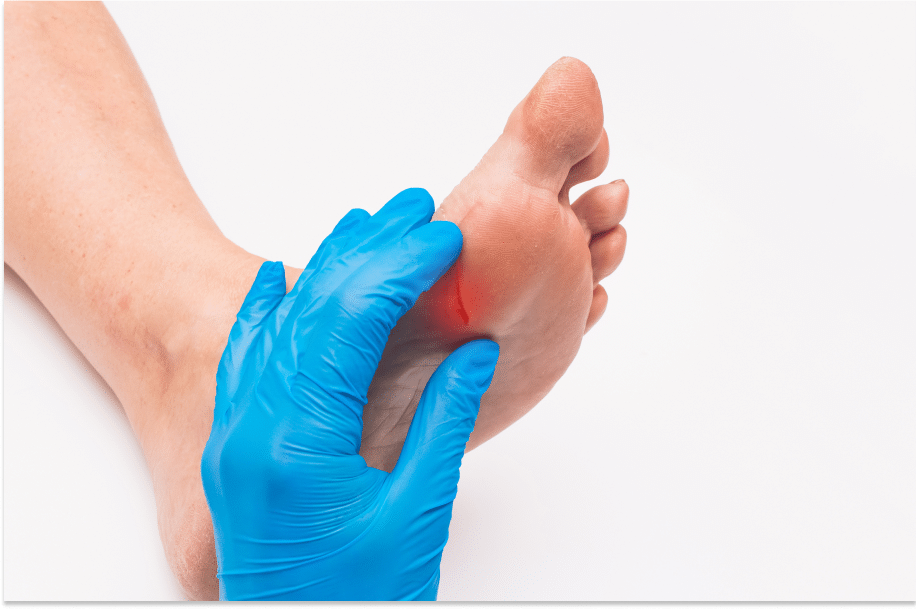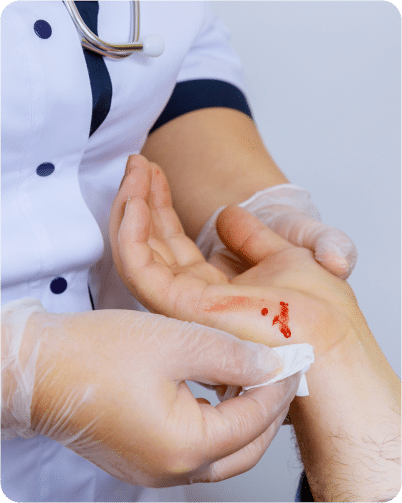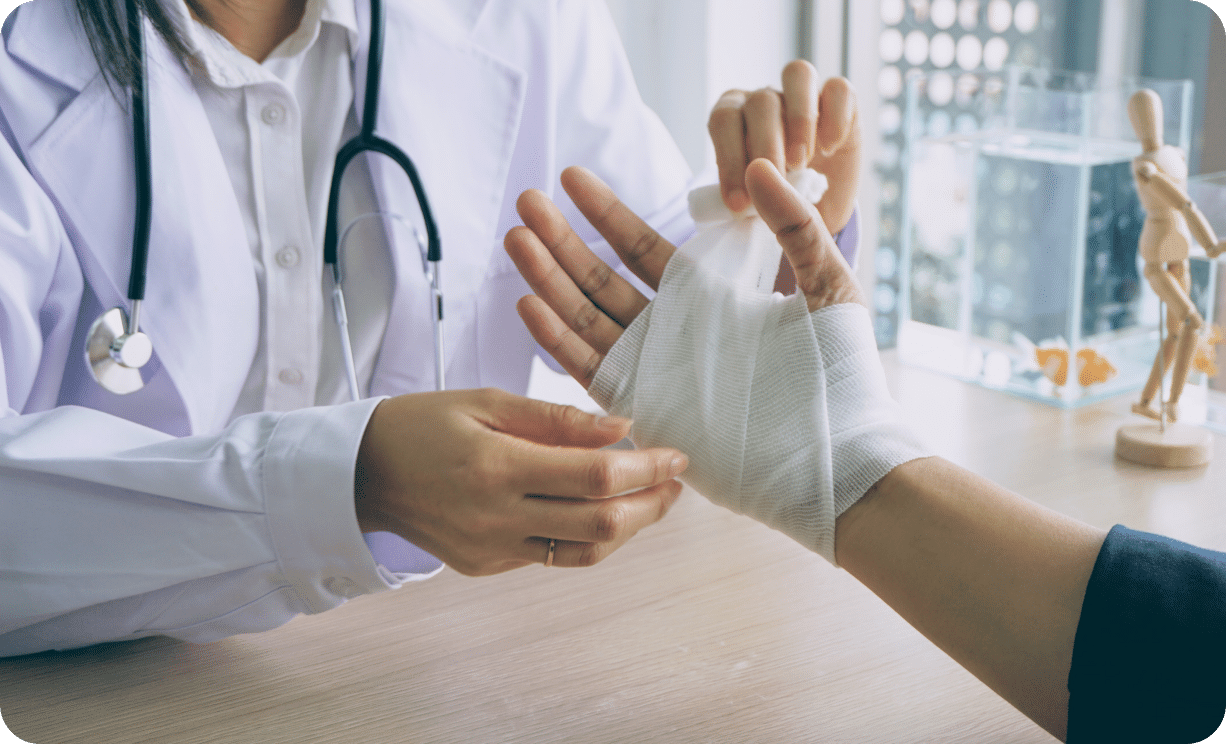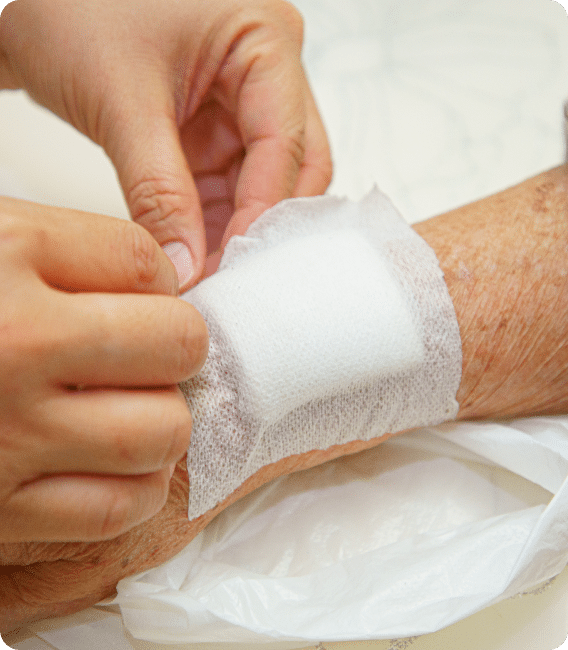
Lacerations
Understanding Lacerations and Their Treatment
What are Lacerations?
Lacerations are cuts or tears in the skin caused by various traumatic events or accidents. They can vary in severity, from superficial scratches to deep wounds that extend into the underlying tissues. Lacerations often result from sharp objects, such as knives, broken glass, or metal, but can also occur due to blunt trauma or abrasions.
Treatment of Lacerations
So, you’ve got a cut, a tear in your skin, also known as a laceration. They happen for all sorts of reasons, as we mentioned above. But what do you do when you’ve got one? First off, if it’s a small cut, you can often manage it at home. Clean it gently with soap and water to get rid of any dirt or debris. Then, cover it with a bandage or adhesive strip to protect it while it heals. Keep an eye on it for signs of infection, like redness, swelling, or pus.
But what if it’s a bit deeper or more serious? Well, that’s when you might need some professional help. If the bleeding won’t stop or if the cut is gaping open, it’s best to see a healthcare provider. They can clean the wound thoroughly, remove any debris, and decide if it needs stitches, staples, or adhesive strips to close it up. Here are some key aspects for lacerations treatments:
- Follow-Up Care: It's essential to monitor the laceration for signs of infection, such as increased redness, swelling, warmth, or pus drainage. Follow any additional instructions provided by a healthcare professional and attend follow-up appointments as scheduled.
- Control Bleeding: Apply direct pressure to the wound using a clean cloth or sterile gauze to control bleeding. Elevate the injured area if possible.
- Clean the Wound: Rinse the laceration with clean water to remove dirt, debris, and bacteria. Avoid using soap, hydrogen peroxide, or alcohol, as they can irritate the wound.
- Debridement: If necessary, remove any foreign objects or dead tissue from the wound to promote healing and reduce the risk of infection. This process is called debridement and is typically performed by a healthcare professional.
- Wound Closure: Depending on the size and depth of the laceration, wound closure may be necessary to facilitate healing and minimize scarring.
- Options for closure include:
- Sutures (Stitches): Used for deep or gaping wounds that require precise alignment of the skin edges.
- Staples: Similar to sutures, staples are used for larger wounds and can be quicker to apply.
- Tissue Adhesives (Skin Glue): Liquid adhesives that bond the edges of the wound together and provide a waterproof seal.
- Dress and Protect: After closing the wound, apply an appropriate dressing to keep the area clean and protected. Change the dressing regularly as directed by a healthcare professional.
- Pain Management: Over-the-counter pain relievers such as acetaminophen or ibuprofen can help alleviate pain and discomfort associated with lacerations. Prescription pain medications may be necessary for more severe injuries.
- Follow-Up Care: It's essential to monitor the laceration for signs of infection, such as increased redness, swelling, warmth, or pus drainage. Follow any additional instructions provided by a healthcare professional and attend follow-up appointments as scheduled.

When to Seek Medical Attention?

While minor lacerations can often be treated at home, seek medical attention if:
- The laceration is deep, long, or gaping.
- Bleeding cannot be controlled with direct pressure.
- The wound is located on the face, near a joint, or involves a significant amount of tissue loss.
- Signs of Infection: If the abrasion shows signs of infection, such as increasing redness, swelling, warmth, or the presence of pus-like drainage, medical attention is needed.
- Signs of infection develop, such as increased redness, swelling, warmth, or pus drainage.
- You are unsure about the severity of the injury or how to properly treat it.
Prompt and appropriate treatment of lacerations is essential for optimal healing and to reduce the risk of complications. Always consult a healthcare professional if you have any concerns about a laceration or wound.
Learn MoreOur Approach
To Lacerations Care
At MetaCure we prioritize the well-being and comfort of our patients. Our experienced team of healthcare professionals is dedicated to providing prompt, comprehensive, and compassionate care for lacerations of all types and severities.

Our Abrasion Treatments
In the field of wound care, various specialties and areas of expertise exist to address the diverse needs of patients with different types of wounds and underlying health conditions.
